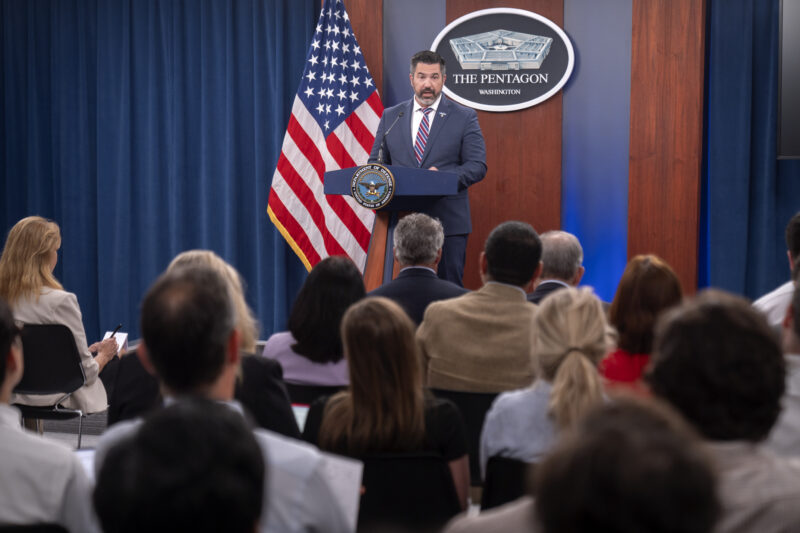This is the third such effort Sen. Bernie Sanders has initiated since November 2024
Win McNamee/Getty Images
Sen. Bernie Sanders (I-VT)
Sen. Bernie Sanders (I-VT) introduced a joint resolution of disapproval on Monday to block an arms transfer to Israel, setting up another Senate floor battle on Wednesday over U.S. aid to Israel — the third since November of last year.
The resolution comes as criticism of Israel has reached new heights among Senate Democrats over the humanitarian situation in Gaza, a state of affairs that could generate increased support for Sanders’ latest effort.
A Sanders spokesperson said that the resolution would block the sale of $1 million worth of assault rifles to “to the police force overseen by extremist minister Itamar Ben-Gvir, who has long advocated for the forcible expulsion of Palestinians from the region, has been convicted by an Israeli court of racist incitement and supporting the Kahanist terror organization, and has been distributing weapons to violent settlers in the West Bank.”
“At a time when Israeli soldiers are shooting civilians trying to get food aid on a near-daily basis, the United States should not be providing more weapons to Israeli security forces,” the Sanders spokesperson said.
Sanders is forcing a vote on Wednesday on this new resolution as well as one relating to bombs and bomb guidance kits for Israel that he introduced months ago but had not previously called up for a vote.
The spokesperson did not say whether Sanders will force a vote on the resolution, but if he does, it would likely not happen until September, with the Senate expected to depart for its August recess at the end of the week.
“American taxpayer dollars are being used to starve children, bomb civilians and support the cruelty of Netanyahu and his criminal ministers. … The White House and Congress must immediately act to end this war using the full scope of American influence,” Sanders said in a statement last week. “No more military aid to the Netanyahu government. History will condemn those who fail to act in the face of this horror.”
The Vermont senator accused Israel of “using mass starvation to engineer the ethnic cleansing of Gaza” and described the Israeli- and American-backed Gaza Humanitarian Foundation’s aid distribution sites as “death traps for Palestinian civilians, with near-daily massacres.”
In November, the first time Sanders forced votes on aid to Israel, 19 Senate Democrats voted for at least one of three resolutions that came up for consideration. In April, 15 voted for a pair of similar measures.
At least one lawmaker, Sen. Angus King (I-ME), who voted for the first set of resolutions but against the second, would likely flip back to support a new effort to block aid.
“I am through supporting the actions of the current Israeli government and will advocate—and vote — for an end to any United States support whatsoever until there is a demonstrable change in the direction of Israeli policy,” King said in a statement earlier this week. “My litmus test will be simple: no aid of any kind as long as there are starving children in Gaza due to the action or inaction of the Israeli government.”
Connecting Ben-Gvir, a highly controversial figure, to the arms sales could also make some Senate Democrats who’ve opposed other Sanders-led efforts — like those to block the sale of bomb guidance kits — more open to supporting this one.
The union’s board of directors said the proposal ‘would not further NEA’s commitment to academic freedom’

Kristoffer Tripplaar/Sipa via AP Images
A logo sign outside of the headquarters of the National Education Association (NEA) labor union in Washington, D.C. on July 11, 2015.
The National Education Association, the largest teachers’ union in the country, announced on Friday that it would not cut ties with the Anti-Defamation League, declining to implement a contentious resolution approved by its governing body earlier this month that sought to target the Jewish civil rights organization.
“After consideration, it was determined that this proposal would not further NEA’s commitment to academic freedom, our membership or our goals,” the union’s board of directors said in a statement.
The decision came nearly two weeks after the measure was adopted by the NEA’s representative assembly, its annual leadership gathering that drew more than 6,000 union delegates.
“There is no doubt that antisemitism is on the rise. Without equivocation, NEA stands strongly against antisemitism. We always have and we always will,” the NEA’s board wrote. “In this time of division, fighting antisemitism, anti-Arab racism, and other forms of discrimination will take more resources, not fewer. We are ready.”
ADL CEO Jonathan Greenblatt cheered the union’s decision to distance itself from the “misguided” measure.
“We are committed to working with the NEA and all teachers’ unions to join the Jewish community in making clear these hateful campaigns cannot succeed. They must redouble efforts to ensure that Jewish educators are not isolated and subjected to antisemitism in their unions and that students are not subjected to it in the classroom,” Greenblatt said in a statement.
The measure faced fierce backlash from the Jewish world. A letter authored by the ADL expressing opposition to the proposal — which would have discouraged educators from using teaching materials from the ADL — garnered the support of roughly 400 Jewish organizations across the country, including the leadership of the Reform, Conservative and Orthodox movements.
Other outside Jewish groups, including the Conference of Presidents of Major American Jewish Organizations, the American Jewish Committee and Jewish Federations of North America, released a statement welcoming the NEA’s rejection of the anti-ADL resolution.
Democratic Senate contenders haven’t commented on their state party’s adoption of a resolution calling for an Israel arms embargo, among other anti-Israel resolutions

Melissa Sue Gerrits/Getty Images
Voters are lined up at voting booths at Biltmore Forest Town Hall on November 5, 2024 in Asheville, North Carolina. Americans cast their ballots today in the presidential race between Republican nominee former President Donald Trump and Democratic nominee Vice President Kamala Harris, as well as multiple state elections that will determine the balance of power in Congress.
The State Executive Committee of the North Carolina Democratic Party passed a resolution last weekend calling for an arms embargo on Israel, along with a series of other anti-Israel resolutions, moves that Republicans are already planning to use against statewide candidates as a sign of the party’s leftward drift.
The National Republican Senatorial Committee has already seized upon the resolutions as a political weapon against current and potential Democratic Senate candidates — including the race for the battleground seat of retiring Sen. Thom Tillis (R-NC) — with pro-Israel voters.
“North Carolina Democrats like Roy Cooper, Jeff Jackson [and] Wiley Nickel are responsible for their Party’s unapologetic appeasement of pro-Hamas radicals,” NRSC spokesperson Joanna Rodriguez said in a statement, targeting the state’s former governor and former lawmakers, all moderates, with the same broad brush for not speaking out against the state party’s anti-Israel activity.
“Anyone that supports Israel’s right to exist and defend itself must do whatever they can to make sure no North Carolina Democrat is elected to the U.S. Senate in 2026.”
The most prominent Democrats in the state have, thus far, been silent. Gov. Josh Stein; Cooper, the former governor and a likely Senate candidate; Nickel, a former congressman and current Senate candidate; and Jackson, the attorney general and a former congressman all did not respond to requests for comment.
The decision by the North Carolina Democratic Party’s leadership is another blow to the party’s Jewish Caucus — which faced internal opposition as it was forming — who argue that the resolutions are needlessly divisive and distract from what should be the core goal of the party: electing Democrats.
“The Jewish Caucus position is that we need to concentrate on getting a lot more Democrats elected, and we need to change the balance of things in the [North Carolina] House,” Perry Dror, North Carolina Democratic Party Jewish Caucus’ 2nd vice president, told Jewish Insider ahead of the weekend meeting. “It’s not going to do a thing to change the situation in the Middle East, it’s just going to divide the party and give all kinds of cannon fodder for the Republicans.”
The North Carolina Democratic Party also did not respond to a request for comment.
A source familiar with the proceedings at the State Executive Committee (SEC) meeting said that the final vote on the embargo resolution was close — a single-digit margin of victory out of hundreds of votes. Some members who had planned to vote against the resolutions were absent.
There was insufficient time for the committee to consider a series of other Israel-related resolutions, including a “Resolution for Democratic Unity,” which “condemns any and all acts of terrorism perpetrated Israel or Hamas” and “calls for the immediate release of Palestinian hostages taken by Israel,” in addition to the hostages being held by Hamas. Per meeting rules, since they were not considered, the resolutions were deemed to have been approved.
“A group of extremely vocal progressives were more interested in their issue, their singular issue, than they were with fighting for things that North Carolinians really are interested in, like what’s going to happen to Medicare and Medicaid, the price of housing, women’s reproductive rights,” Lisa Jewel, the president of the Jewish Caucus, told JI.
Jewel emphasized that the Jewish Caucus’ membership, totaling more than 500, is broad and is not in complete agreement on all issues pertaining to Israel, but the members largely agree that these resolutions will be harmful to the party. She said the Jewish Caucus has tried to work constructively with other groups pushing anti-Israel stances but has been rebuffed, and said party leadership needs to step up and take charge.
Jewel and other Jewish Caucus leaders emphasized that they want to see the party adopt a big-tent approach and focus on practical issues that affect North Carolina and local Democrats’ electoral prospects.
“I just need people to understand that antisemitism in North Carolina is double what it is nationwide. The antisemitic incidents are increasing, and they don’t get that. They don’t understand that their vote … is really affecting us,” Jewel said. “I really appreciate young peoples’ passions, but they don’t always think about what the repercussions are.”
Jewel attributed the issues in part to a lack of leadership from the party’s leaders, whom she said in an interview on Friday had seemed “flustered” by Israel and Middle East issues and took a back seat when they came up, rather than trying to bring party members together.
Caucus leaders said that the push for the anti-Israel resolutions had been growing for several years, and came to a head this year.
Resolutions like these are generated by local precincts and are passed up to the county, then congressional district, then state level, to the Resolutions Committee. The committee had a backlog of hundreds of resolutions to work through from both the current and previous year, which Amy DeLoach, the first vice president of the Jewish Caucus and a member of the Resolutions Committee, told JI before the weekend votes.
“It was literally an unachievable task,” DeLoach said. She said the Resolutions Committee chairs “did the best they could” but were facing “a group that were very persistent” in pressing to prioritize moving the Israel-related resolutions ahead to the full state party, rather than taking additional time to go through normal procedures and allow for further review.
DeLoach said she’s seen firsthand, as a state House candidate, the way that party resolutions can hurt Democratic candidates, blaming her own loss on Republicans tying her to a Progressive Caucus push to legalize drugs.
“These resolutions are nothing but a way to hamper the candidates, and the Jewish Caucus wants to do things that are going to push the Democratic Party forward,” DeLoach said.
Dror said that progressives, members of the Interfaith Caucus, as well as some members of the Muslim and Arab caucuses, “just nonstop harp on Israel.”
The chair of the party’s Interfaith Caucus, days after the Oct. 7, 2023, Hamas attacks on Israel, defended the attack as “retaliation” for a supposed growth in Jewish visitors to the Temple Mount.
Sen. John Fetterman was the only Democrat who opposed the resolution and Sen. Rand Paul was the only Republican who supported it

Drew Angerer/Getty Images
Sen. Tim Kaine (D-VA) speaks to reporters on his way to a classified all-Senate briefing
The Senate voted down Sen. Tim Kaine’s (D-VA) war powers resolution that would have blocked additional U.S. military action against Iran on Friday evening, with nearly all Democrats voting in favor of the resolution, and almost all Republicans voting against it.
The resolution failed, 53-47, with Sen. Rand Paul (R-KY) being the only Republican to vote in favor and Sen. John Fetterman (D-PA) being the only Democrat to vote against.
Kaine said in an address prior to the vote that while he acknowledged the need for U.S. military engagement in certain instances, any offensive actions required the approval of the legislative branch.
“The United States needs to defend itself and it needs to work with allies to help them defend themselves,” Kaine said. “But our troops, our sons and daughters, deserve to have wise civilian leadership that only make the decision to send them into war on the basis of careful consideration and a debate before the entire public.”
The Virginia senator, who has long been a champion of enforcing Congressional war powers, argued the president does not have the authority “to go on offense against another nation or an entity like a terrorist group.”
In response, Sen. Lindsey Graham (R-SC), one of the most vocal supporters of the strikes in the Senate, said that requiring congressional approval would be a “disaster for the country” and upend the military command structure.
“Since the founding of this country, it’s been understood that the commander in chief can act, as the commander in chief, to protect our nation from threats — that he is in charge of the military. He’s the civilian in charge of the military, and it’s his decision to use military force,” Graham said. He noted that Congress has only declared war five times but engaged in hundreds of military actions, and said Congress can cut off funding for military operations if it does not agree with the executive.
“Just think of the chaos that would ensue in this country if there were not one commander in chief, but 535,” Graham reiterated, adding that the reaction from Congress to the strikes and conflicting intelligence about their efficacy shows that Congress would not be able to act decisively if consulted.
He said it would not be practical for the administration to have to wait for Congress to act in response to a future nuclear facility or threat to U.S. forces, “and that’s not what the founders meant.”
Several Senate Republicans who backed a similar resolution in 2020 following the U.S. strike that killed Islamic Revolutionary Guard Corps Gen. Qassem Soleimani voted, this time, against the resolution. That list included Sen. Todd Young (R-IN), Bill Cassidy (R-LA), Susan Collins (R-ME), Mike Lee (R-UT) and Jerry Moran (R-KS).
Collins noted in her statement that Iran had “threatened to attack Americans on our own soil and around the world” after Israel launched its operation to take out its nuclear program. She also said she supported the strikes and the subsequent ceasefire, both of which made it “the wrong time to consider this resolution and to risk inadvertently sending a message to Iran that the President cannot swiftly defend Americans at home and abroad.”
“I continue to believe that Congress has an important responsibility to authorize the sustained use of military force. That is not the situation we are facing now,” Collins said. “The president has the authority to defend our nation and our troops around the world against the threat of attack.”
Lee said that determinations around war powers are “heavily fact-dependent.”
“We got a classified briefing yesterday. The totality of the circumstances that they outlined, including the finality of the action they’d taken — there’s no ongoing operations there,” Lee said.
Sen. Jacky Rosen (D-NV), one of the Senate’s most vocal pro-Israel Democrats, said in a statement that she hopes the strikes are successful in the long-term, that Iran must be prevented from obtaining nuclear weapons, that the U.S. must defend its personnel and that she would “continue to back Israel should it need to respond to a break in the agreement.”
“At the same time, the U.S. Constitution gives Congress the power to declare war and authorize any offensive attacks on other sovereign nations,” Rosen said. “The decision to go to war and put our troops in harm’s way is one that cannot be made lightly, and must be made by Congress, which is why I voted today to advance the War Powers Resolution.”
Sen. Josh Hawley (R-MO), who has advocated for a more restrained approach to U.S. foreign policy, dismissed arguments that the War Powers Act was applicable to the strikes ordered by Trump, which he called “an Article II matter.”
“I think, probably, the War Powers Act is unconstitutional. Some parts of the War Powers Act are kind of closer questions, but I think this is actually not very hard. I mean, if a president, any president of any party, cannot order one-off, limited military strikes without the approval of Congress, why do we have Article II?” Hawley asked.
“Go back and read the debates, and exactly what the framers did not want was foreign policy by committee, so I think this is not a close question. You can be opposed to the strikes and still be like, ‘Wow, this is not a good idea, this resolution,’” he told JI, adding that Trump was “100%” acting within his constitutional authority.
The legislation counts Senate leaders Thune, Schumer among its original co-sponsors

Kevin Carter/Getty Images
The U.S. Capitol Building is seen at sunset on May 31, 2025 in Washington, DC.
Top Senate leaders introduced a bipartisan resolution on Monday condemning the recent antisemitic attacks in Washington and Boulder, Colo.
The resolution is being led by Sens. James Lankford (R-OK) and Jacky Rosen (D-NV), joined by Senate Majority Leader John Thune (R-SD) and Minority Leader Chuck Schumer (D-NY), as well as Sens. Michael Bennet (D-CO), John Hickenlooper (D-CO), Dave McCormick (R-PA), John Fetterman (D-PA) and Jerry Moran (R-KS).
The resolution highlights that both attackers professed to have been motivated by the war in Gaza and shouted slogans including “Free Palestine,” during their attacks. It also notes that both suspects have been lionized online as heroes and that both attacks have prompted “calls for more violence.”
It describes the attacks as a “result of antisemitism, extremism, and political violence, which are threats not only to Jewish individuals, but to all of society in the United States.”
“Antisemitism is not just a Jewish problem, but a problem that threatens democracy and all of humanity,” the resolution declares. “Fighting antisemitism will not only protect the Jewish community in the United States but also protect our democracy.”
The legislation mourns slain Israeli Embassy staffers Sarah Milgrim and Yaron Lischinsky, condemns antisemitism, expresses support for the Jewish community and “encourages all of society to denounce and combat all manifestations of antisemitism and ensure that antisemitism is not normalized.”
It also highlights “the importance of resources and action in the aftermath of attacks, including the distribution of resources from the Nonprofit Security Grant Program.”
Lankford said in a statement the two attacks are “horrific reminders of the unfortunate rise in antisemitism across our country.”
“This resolution makes it clear: we unequivocally condemn antisemitism in all its forms,” Lankford said. “Our Jewish friends and neighbors should not live in fear because of their faith and heritage, and this resolution affirms the right to live their faith freely.”
Lankford and Rosen are the co-chairs of the Senate antisemitism task force.
“Communities across our country are experiencing an increase in antisemitic vandalism, threats, and violence that endangers the safety of Jewish Americans, like the recent attacks in Washington and Colorado,” Rosen said. “We have a responsibility to call out antisemitism and do everything we can to combat acts of hate in all of its forms. Senator Lankford and I introduced this bipartisan resolution to condemn recent attacks and recommit to doing all we can to tackle the alarming rise of antisemitic incidents.”
McCormick and Fetterman introduced a similar resolution last week, with 34 cosponsors, that highlighted the Washington and Boulder attacks as well as the arson attack on Pennsylvania Gov. Josh Shapiro’s residence during Passover.
That resolution is a companion to one that passed with near-unanimous support in the House earlier this month.
Reps. Massie and Khanna are standing down on their war powers resolution, but Democrats in the House and Senate will continue to push ahead with other legislation

Aaron Schwartz/Sipa USA via AP Images
Rep, Jim Himes (D-CT) gives remarks on camera outside the House Chamber of the Capitol Building on Thursday April 10, 2025.
House and Senate Democrats are pushing ahead with efforts to bring forward votes this week in both chambers on resolutions that aim to constrain the administration from taking any further military action against Iran in spite of President Donald Trump’s surprise announcement of a ceasefire between Israel and Iran.
Trump’s diplomatic breakthrough is creating some political awkwardness for Democrats who had insisted the president would escalate the war, but many are still likely to support the resolutions, which reflect their dissatisfaction with the president’s decision to strike Iran’s nuclear facilities without congressional authorization.
Rep. Thomas Massie (R-KY), the lead sponsor of one war powers resolution in the House, said he no longer plans to force a vote on it, explaining, “if we’re not engaged in hostilities, I think it’s a moot point.” He said he had told House Speaker Mike Johnson (R-LA) that he would not attempt to bring the resolution to the floor.
Rep. Ro Khanna (D-CA), Massie’s lead co-sponsor, said, “The anti-war advocacy of the left and right broke through. I am glad cooler heads prevailed and Trump seems committed to stopping this war. I spoke with Rep. Massie this evening and we are taking a wait and see approach about whether a vote will be needed now on our War Powers Resolution.”
But a group of senior House Democrats introduced a separate resolution on Monday evening, which they are expected to continue to advance.
The U.S. strike, Massie’s resolution and broader questions about the situation in Iran have been causing heartburn for many House Democrats, particularly supporters of Israel, Democratic staff sources told Jewish Insider earlier Tuesday.
Democratic staffers not authorized to speak publicly explained that, behind the scenes, the largely unified public Democratic opposition to the strikes has been driven by several factors, including the perceived lack of political support for the strikes, concerns about an escalating war and frustration with the Trump administration.
“I think a lot of members support the strike privately but see this as a politically vulnerable issue for [Trump],” one Democratic staffer said.
Another staffer said that Democrats are afraid of echoes of the Iraq war: If the U.S. ends up in a full-scale, protracted, politically unpopular war with Iran, they don’t want to be on record as having supported it.
And, the staffer said, there’s a deep level of distrust for the Trump administration, which acted largely unilaterally in the strikes, did not make efforts to keep congressional leaders informed about the strikes and hasn’t yet presented any evidence to Congress of the need for the strikes or their success.
Rep. Jim Himes (D-CT), the ranking member of the House Intelligence Committee, who worked with other top Democrats on an alternative war powers resolution, said the resolution effort should continue “if United States forces remain engaged.”
Himes, along with Reps. Greg Meeks (D-NY) and Adam Smith (D-WA), the top Democrats on the Foreign Affairs and Armed Services committees, introduced their own war powers resolution Monday evening, after the ceasefire was announced.
Whether that resolution will come to the floor remains an open question. The House speaker was reportedly working on a procedural plan that would strip the Massie resolution of its privileged status, sidestepping a vote on the House floor, and could potentially use the same tactic to defuse the new Democratic resolution.
On the Senate side, Sen. Tim Kaine (D-VA) said he also plans to push forward with his efforts, and said that Senate Majority Leader John Thune (R-SD) is working with Minority Leader Chuck Schumer (D-NY) to facilitate a vote.
“Whether or not a ceasefire between Israel and Iran comes to fruition — and I hope it does — I will move forward to force a vote on my resolution to require Congress to debate and vote on whether or not the United States should engage in a war with Iran,” Kaine said in a statement to JI. “Americans don’t want matters of war and peace, bombing and ceasefire, to rest upon the daily whims of any one person.”
“That’s why the Framers of our Constitution decided that war should only be declared following a public debate and congressional vote,” Kaine continued. “Congress must affirm its commitment to that principle and send a clear message: no more endless wars.”
Other Democrats agreed that a war powers resolution should still receive a vote in spite of the ceasefire.
Rep. Greg Casar (D-TX), the chairman of the Congressional Progressive Caucus, told JI, “At the end of the day, I think that a war powers resolution makes good sense to vote on and for Congress to finally reassert what is in black-and-white letters in the Constitution, which is that only Congress and the consent of the American people can start a war.”
Rep. Pat Ryan (D-NY), a former Army intelligence officer, argued that the uncertainty of the situation necessitated that Congress step in.
“It’s a very volatile situation, which, to me, makes it even more urgent that we make clear and reassert what the Constitution of the United States says, which is that it is the Congress that has the authority to declare war or authorize the use of [force],” Ryan told JI.
He added that it “should be concerning to every American that multiple days after doing — not even a preemptive strike — a preventive strike, there’s still no legal justification, there’s still no clarity about the effectiveness.”
A memo sent by Trump to the Senate cited presidential foreign relations authorities enshrined in the U.S. constitution as the legal backing for the strike.
Rep. Jared Moskowitz (D-FL), among the few House Democrats who supported the strikes, told JI that he wants to see Congress reclaim its power but that the administration also has the ability to take defensive action without consulting Congress. He said that the war powers resolution push is likely no longer relevant if the ceasefire continues.
“Based on the ceasefire that was announced, it if holds, it appears that the issue in this current climate is moot, but overall, still important,” Moskowitz said. “[The war powers resolution] is no longer relevant to this particular purpose. It would be more of a general ‘us reasserting our authority as Congress.’”
Kaine told reporters earlier in the day that his resolution in the Senate would come up for a vote on Thursday or Friday.
Kaine said that the vote was “fluid” but he expected to see Republican support, and that he expected nearly all Democrats, with the exception of Sen. John Fetterman (D-PA), to support it.
“I think the fluidity and change is something that I think warrants — this is why you get a congressional discussion, because these things can escalate,” Kaine said. “They can move in ways that are hard to predict, and that’s why a discussion and a vote is a good idea.”
He said that, “my colleagues on the Democratic side, regardless of whatever they feel about Iran, [believe] wars without Congress, wars that bypass us, are a bad idea.”
Sen. Rand Paul (R-KY) confirmed he planned to support the resolution as well, arguing that the Constitution is clear that war powers are vested in Congress and that his position on the issue has been consistent across administrations.
“There have always been people who argue the president can do whatever he wants,” Paul said. “The problem is, that’s a recipe for chronic intervention. It’s a recipe for endless war.”
Sen. Adam Schiff (D-CA), a pro-Israel Democrat, also said he supported the resolution.
Ahead of the ceasefire, some specific concerns with the wording of the Massie resolution had split Democrats, one Democratic staffer said. That prompted the separate resolution from Meeks, Himes and Smith. House Minority Leader Hakeem Jeffries (D-NY) claimed at a press conference on Monday that he hadn’t reviewed the Massie resolution yet, indicating that he would not be supporting it.
A Democratic staffer explained that there were fairly widespread concerns that Massie’s resolution could block the U.S. from continuing to support Israel’s defense.
The Democrat-led resolution includes a specific exception allowing the U.S. to defend itself or any ally or partner from “imminent attack,” whereas Massie’s resolution only allowed for continued defense of the United States and intelligence sharing with allies. The Democrats leading the resolution emphasized in a statement that it would allow U.S. forces defending Israel to continue their activities.
“What we’re trying to get clarity on is to ensure that there’s no ambiguity or doubt about our ability to fully support the defense of Israel and the Israeli people, that we can continue … intelligence sharing and information sharing, cyber,” Ryan said earlier, of the Massie resolution. “There are key dimensions where we have to continue to be very closely aligned.”
“My concern is less about the language of the resolution and more about who introduced it, frankly,” Ryan continued. Massie has a history of comments that colleagues on both sides of the aisle have condemned as antisemitic.
Jeffries, at his press conference, largely focused on the fact that the Trump administration had failed to inform Congress about the strikes in the normal manner and had still not provided a proper justification for the strikes or accounted for Iran’s nuclear material.
He also argued that the administration’s claims to have destroyed Iran’s nuclear program completely couldn’t be trusted.
Rep. Steny Hoyer (D-MD), a former House majority leader and perhaps the most prominent Democratic supporter of the strikes, told JI that his support for the strikes was consistent with unilateral action taken by administrations dating back to President Bill Clinton.
He added that it would be “hypocritical” not to support the strikes now, when administrations have said for decades that they will not permit a nuclear Iran, and said that the recent International Atomic Energy Agency report showed that Iran was “too close” to a nuclear weapon and “stopping them was the right thing to do.”
Hoyer also noted that Congress moves more slowly than the executive branch and that a slow public debate over a potential strike in Congress over strikes would have “incentivized [Iran] to move ahead as quickly as possible.”
He said that as a general matter, however, he believes that it is important for Congress to be able to put a check on the administration’s ability to go to war, though he said that the decision to strike Iran was a long time coming.
Fetterman, the only Senate Democrat who has announced he plans to oppose the war powers resolution, blasted some colleagues who have called the strikes unconstitutional. He said he would have opposed the Kaine resolution before the strikes.
He noted that previous Democratic administrations had conducted similar “one-off” strikes and argued that congressional approval would only be needed if the U.S. was going to start a broader, protracted war.
Fetterman also blasted Democrats for joining Massie’s effort calling him, “that weirdo from Kentucky.”
Among Republicans, Massie’s resolution may have seen some additional support from a handful of isolationist Republicans, but likely not many. Rep. Marjorie Taylor Greene (R-GA), the Republican who, alongside Massie, has been most outspoken against the U.S. strike, told Punchbowl News she would not support the effort.
But she also said she wanted to push to cut off U.S. aid to Israel, and has previously condemned Israel’s military action against Iran.
The resolution, with 16 co-sponsors, marks a bipartisan show of support for the Israeli operations as members of the far left and far right oppose Israel’s operation

SAN/Middle East Images/AFP via Getty Images
Smoke rises from a location allegedly targeted in Israel's wave of strikes on Tehran, Iran, on early morning of June 13, 2025.
A new bipartisan resolution introduced by Reps. Claudia Tenney (R-NY) and Brad Sherman (D-CA) and 14 co-sponsors on Tuesday praises Israel’s strikes on Iranian nuclear and military facilities and condemns Iran’s retaliatory missile attacks on Israeli civilian targets.
The resolution marks a bipartisan show of support for the Israeli operation even as elements of the far left and far right are warning that the Israeli strikes risk dragging the U.S. into a regional or global war and run counter to American interests.
The resolution states that the House “stands with Israel as it takes targeted military actions to dismantle Iran’s nuclear enrichment capabilities and defend itself against the existential threat of a nuclear-armed Iran,” “recognizes that Israel’s preemptive and proportional strikes against Iran’s nuclear sites advance the United States’ vital national security interest in a nuclear free Iran” and “reaffirms Israel’s right to self-defense.”
The legislation further states that the House “stands ready to assist Israel with emergency resupply and other security, diplomatic, and intelligence support.”
It asserts that the war came “after exhausting all diplomatic avenues,” and describes the Israeli operation as “intelligence-driven preemptive strikes to prevent Iran from acquiring nuclear weapons and such capability explicitly designed to achieve the destruction of Israel and the United States,” which, the resolution states, has “achieved national security objectives without risking American lives.”
The resolution also condemns Iran’s “indiscriminate attacks against civilians in Israel” and its repression of its own citizens, and calls on Tehran to give up its pursuit of nuclear weapons and dismantle its nuclear program and urges other countries to support that goal.
The legislation accuses Iran of having “repeatedly rejected good-faith diplomatic efforts by the United and others to address its nuclear program” and of not negotiating “in good faith.”
The resolution is co-sponsored by Reps. Don Bacon (R-NE), Jeff Van Drew (R-NJ), Josh Gottheimer (D-NJ), Elise Stefanik (R-NY), Brian Fitzpatrick (R-PA), Maria Elvira Salazar (R-FL), Shri Thanedar (D-MI),Roger Aderholt (R-AL), Mike Lawler (R-NY), Juan Ciscomani (R-AZ), Chris Smith (R-NJ), Scott Fitzgerald (R-WI), Randy Feenstra (R-IA) and Tom Barrett (R-MI), and supported by FDD Action, the Jewish Institute for National Security of America and the American Jewish Committee.
The resolution highlights that Iran had been increasing its enrichment activity, stockpiling enough highly enriched uranium for six nuclear weapons and blocking international inspections, among other steps that have brought it closer to a nuclear bomb.
It notes that the International Atomic Energy Agency recently censured Iran for violating its nuclear Non-Proliferation Treaty commitments, and that Iran responded by further increasing its enrichment activities.
“This bipartisan resolution reaffirms the United States’ unwavering support for Israel’s right to self-defense and for its bold, courageous efforts to dismantle Iran’s nuclear program once and for all,” Tenney said in a statement. “The U.S.-Israel partnership remains unshakable, and this resolution sends a clear and unified message: we will work together to ensure the Iranian regime is never able to obtain a nuclear weapon.”
Sherman, in a statement, argued that Iran’s activities had made Israel’s strikes necessary.
“The Islamic Republic of Iran has made clear time and time again its intent to ‘annihilate’ Israel and attack the United States and has funded direct military attacks on Israel and the United States for decades It’s regrettable that Iran’s decades of violation of the Nuclear Non-Proliferation Treaty (NPT) which it signed has led us to a point where this is necessary,” Sherman said. “The only thing more dangerous than this war is an Ayatollah with access to nuclear weapons. Israel could not wait until Iran had a stockpile of nuclear weapons ready to be launched.”














































































